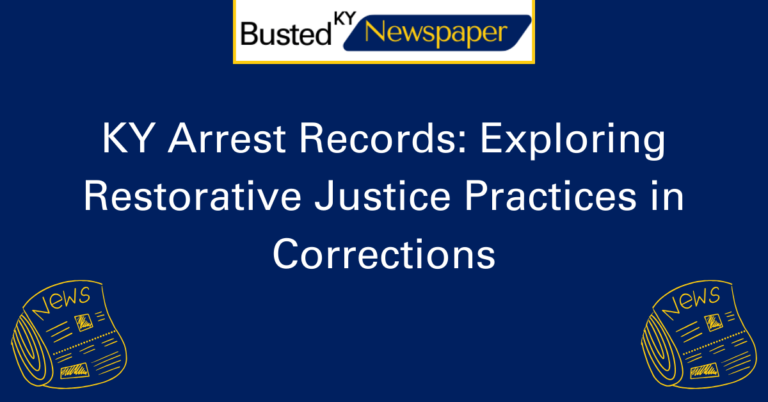KY Arrest Records and Employment: A Legal Perspective
In today’s increasingly competitive job market, employers must conduct thorough background checks on potential candidates. One aspect of this process is reviewing an applicant’s arrest records, which can provide valuable insights into their character and potential risk to the company. Understanding the legal perspective surrounding KY arrest records and employment is essential for both employers and job seekers alike.
Employers in Kentucky have the right to access an individual’s arrest records during the hiring process. However, it is important to note that the mere existence of an arrest does not necessarily indicate guilt or criminal activity. The legal system operates on the principle of “innocent until proven guilty,” and individuals are considered innocent unless convicted in a court of law. Therefore, employers must approach arrest records with caution and consider the specifics of each case before making any employment decisions.
Understanding the Legal Framework
When it comes to accessing arrest records for employment purposes, both employers and job seekers in Kentucky need to understand the legal framework surrounding this practice. While employers have the right to review an individual’s arrest records, it is crucial to remember that an arrest does not equate to guilt. The legal system operates on the principle of “innocent until proven guilty,” and individuals should be considered innocent unless convicted in a court of law. Therefore, employers need to approach arrest records with caution and consider the specifics of each case.
The Importance of Context
Employers must recognize the significance of context when reviewing arrest records. Simply having an arrest record should not automatically disqualify a candidate from employment. It is essential to delve deeper into the details of the arrest and consider factors such as the nature of the offense, the outcome of the case, and the time that has passed since the incident. This thorough evaluation ensures fair treatment and avoids potential discrimination based solely on arrest records.
Ensuring Fairness and Equal Opportunities
Incorporating arrest records into the hiring process must be done with fairness and equal opportunities in mind. Employers should establish clear guidelines and criteria for assessing arrest records, ensuring consistency in their decision-making process. It is essential to treat all applicants equally, regardless of their background, and to allow them to provide an explanation or context for their arrest record if necessary.
The Role of Rehabilitation and Growth
When considering arrest records, employers should also take into account the potential for rehabilitation and personal growth. People make mistakes, and an arrest record does not define an individual’s character or potential for success. Employers need to acknowledge the possibility of personal growth and give individuals a chance to demonstrate their skills, qualifications, and commitment to self-improvement.
Protecting Privacy and Confidentiality
Respecting an individual’s privacy and maintaining confidentiality is crucial throughout the process of reviewing arrest records. Employers must handle this sensitive information with care and ensure that it is not disclosed to unauthorized individuals or used for any discriminatory purposes. Adhering to privacy laws and regulations safeguards the rights and reputation of both job seekers and employers.
Seeking Professional Guidance
Given the complexities surrounding the use of arrest records in employment decisions, employers should seek professional guidance. Legal experts or human resources professionals can provide valuable insights and assist in developing fair and effective policies for accessing and evaluating arrest records. This proactive approach helps employers make informed decisions while minimizing the risk of legal complications.
FAQ’s
In Kentucky, employers can legally access arrest records as part of background checks, but they must adhere to regulations outlined in the Fair Credit Reporting Act (FCRA) and state statutes. Employers should be mindful of not considering arrests without convictions or dismissed charges to avoid potential legal issues.
Do arrest records indicate guilt or criminal activity?
Arrest records alone do not indicate guilt or criminal activity. An arrest is merely an initial stage in legal proceedings, and individuals may be innocent, with charges dropped or acquitted later. Employers should exercise caution and consider the broader context when interpreting arrest records to avoid making unfair assumptions about a candidate’s suitability for a position.
When reviewing arrest records, employers should consider several factors to make fair and informed decisions. The nature and severity of the charges, the time elapsed since the arrest, and any subsequent legal outcomes are crucial aspects to evaluate. Additionally, employers should assess the relevance of the arrest to the specific job responsibilities. For instance, a past arrest for a non-violent offense may have different implications for a candidate applying for a financial position compared to one in a customer service role. By taking a nuanced approach and considering these factors, employers can make more thoughtful judgments regarding a candidate’s fitness for a particular job.
Conclusion
In conclusion, the use of arrest records in the hiring process is a practice that requires careful consideration and adherence to legal principles. Employers in Kentucky have the right to access an individual’s arrest records, but they must approach this information with caution, considering the context, fairness, and equal opportunities. Recognizing the potential for rehabilitation, respecting privacy, and seeking professional guidance are crucial elements in ensuring a fair and responsible evaluation of arrest records. By incorporating these principles, employers can make informed decisions while providing equal opportunities for all job seekers.







